

Moll Flanders. The Fortunes and Misfortunes of the Famous Moll Flanders (commonly known simply as Moll Flanders) is a novel by Daniel Defoe, first published in 1722.
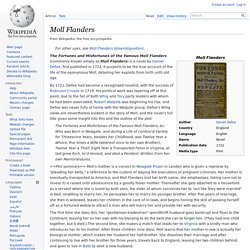
It purports to be the true account of the life of the eponymous Moll, detailing her exploits from birth until old age. By 1721, Defoe had become a recognised novelist, with the success of Robinson Crusoe in 1719. His political work was tapering off at this point, due to the fall of both Whig and Tory party leaders with whom he had been associated; Robert Walpole was beginning his rise, and Defoe was never fully at home with the Walpole group.
Moby-Dick. The product of a year and a half of writing, the book is dedicated to Nathaniel Hawthorne, "in token of my admiration for his genius," and draws on Melville's experience at sea, on his reading in whaling literature, and on literary inspirations such as Shakespeare and the Bible.
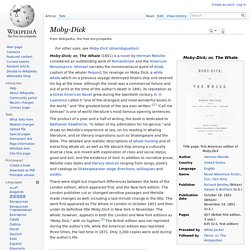
The detailed and realistic descriptions of whale hunting and of extracting whale oil, as well as life aboard ship among a culturally diverse crew, are mixed with exploration of class and social status, good and evil, and the existence of God. In addition to narrative prose, Melville uses styles and literary devices ranging from songs, poetry and catalogs to Shakespearean stage directions, soliloquies and asides. The Merchant of Venice. Characters[edit] Summary[edit] Gilbert's Shylock After the Trial, an illustration to The Merchant of Venice.
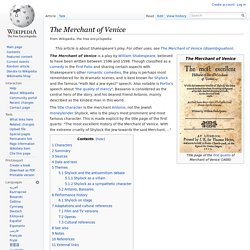
At Venice, Antonio's ships are reported lost at sea. This leaves him unable to satisfy the bond. Shylock is even more determined to exact revenge from Christians after his daughter Jessica had fled home and eloped with the Christian Lorenzo, taking a substantial amount of Shylock's wealth with her, as well as a turquoise ring which was a gift to Shylock from his late wife, Leah. At Belmont, Bassanio receives a letter telling him that Antonio has been unable to return the loan taken from Shylock. Macbeth. A poster for a c. 1884 American production of Macbeth, starring Thomas W.
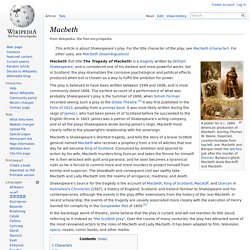
Keene. Depicted, counterclockwise from top-left, are: Macbeth and Banquo meet the witches; just after the murder of Duncan; Banquo's ghost; Macbeth duels Macduff; and Macbeth. Macbeth (full title The Tragedy of Macbeth) is a tragedy written by William Shakespeare, and is considered one of his darkest and most powerful works. Set in Scotland, the play dramatizes the corrosive psychological and political effects produced when evil is chosen as a way to fulfill the ambition for power. The play is believed to have been written between 1599 and 1606, and is most commonly dated 1606. Characters[edit] A Lesson Before Dying. A Lesson Before Dying Is Ernest J.
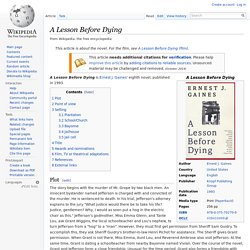
Gaines' eighth novel, published in 1993. Plot[edit] The story begins with the murder of Mr. Grope by two black men. King Lear. "King Lear and the Fool in the Storm" by William Dyce (1806–1864) King Lear is a tragedy by William Shakespeare.
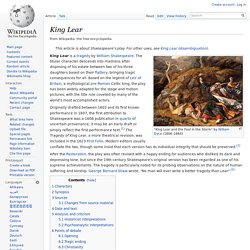
The titular character descends into madness after disposing of his estate between two of his three daughters based on their flattery, bringing tragic consequences for all. Julius Caesar (play) The Tragedy of Julius Caesar is a tragedy by William Shakespeare, believed to have been written in 1599.[1] It is one of several plays written by Shakespeare based on true events from Roman history, which also include Coriolanus and Antony and Cleopatra.
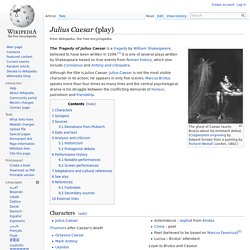
Although the title is Julius Caesar, Julius Caesar is not the most visible character in its action; he appears in only five scenes. Marcus Brutus speaks more than four times as many lines and the central psychological drama is his struggle between the conflicting demands of honour, patriotism and friendship. Marcus Brutus is Caesar's close friend and a Roman praetor. Brutus allows himself to be cajoled into joining a group of conspiring senators because of a growing suspicion—implanted by Caius Cassius—that Caesar intends to turn republican Rome into a monarchy under his own rule. The early scenes deal mainly with Brutus's arguments with Cassius and his struggle with his own conscience. Joseph W. Jude the Obscure. In the Time of the Butterflies. Plot[edit] This is the story of the four Mirabal sisters during the dictatorship of Rafael Trujillo in the Dominican Republic.
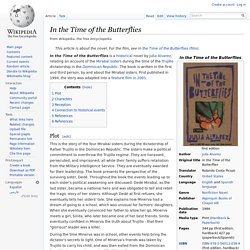
The sisters make a political commitment to overthrow the Trujillo regime. They are harassed, persecuted, and imprisoned, all while their family suffers retaliation from the Military Intelligence Service. They are eventually awarded for their leadership. A House for Mr Biswas. A House for Mr Biswas is a 1961 novel by V.
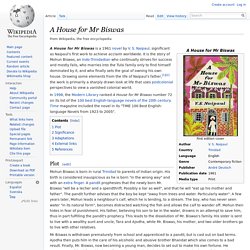
S. Naipaul, significant as Naipaul's first work to achieve acclaim worldwide. The Great Gatsby. Fitzgerald—inspired by the parties he had attended while visiting Long Island's north shore—began planning the novel in 1923, desiring to produce, in his words, "something new—something extraordinary and beautiful and simple and intricately patterned.
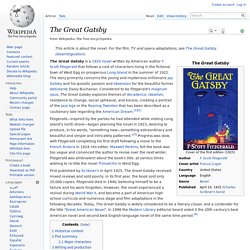
"[3] Progress was slow, with Fitzgerald completing his first draft following a move to the French Riviera in 1924. His editor, Maxwell Perkins, felt the book was too vague and convinced the author to revise over the next winter. Fitzgerald was ambivalent about the book's title, at various times wishing to re-title the novel Trimalchio in West Egg.
First published by Scribner's in April 1925, The Great Gatsby received mixed reviews and sold poorly; in its first year, the book sold only 20,000 copies. Historical context[edit] Great Expectations. Dickens originally intended Great Expectations to be twice as long, but constraints imposed by the management of All the Year Round limited the novel's length. The novel is collected and dense, with a conciseness unusual for Dickens. According to G. K. The Grapes of Wrath. The Grapes of Wrath is an American realist novel written by John Steinbeck and published in 1939. The book won the National Book Award[2] and Pulitzer Prize[3] for fiction, and it was cited prominently when Steinbeck was awarded the Nobel Prize in 1962.[4] Set during the Great Depression, the novel focuses on the Joads, a poor family of tenant farmers driven from their Oklahoma home by drought, economic hardship, agricultural industry changes and bank foreclosures forcing tenant farmers out of work.
Due to their nearly hopeless situation, and in part because they were trapped in the Dust Bowl, the Joads set out for California. Along with thousands of other "Okies", they sought jobs, land, dignity, and a future. Plot[edit] The narrative begins just after Tom Joad is paroled from McAlester prison for homicide. The next morning, Tom and Casy go to Uncle John's. Traveling west on Route 66, the Joad family find the road crowded with other migrants. Characters[edit] Development[edit] Title[edit] Germinal (novel) Germinal [ʒɛʁminal] (1885) is the thirteenth novel in Émile Zola's twenty-volume series Les Rougon-Macquart. Often considered Zola's masterpiece and one of the most significant novels in the French tradition, the novel – an uncompromisingly harsh and realistic story of a coalminers' strike in northern France in the 1860s – has been published and translated in over one hundred countries as well as inspiring five film adaptations and two television productions.
The title page of the 1885 German edition The novel's central character is Étienne Lantier, previously seen in L'Assommoir (1877), and originally to have been the central character in Zola's "murder on the trains" thriller La Bête humaine (1890) before the overwhelmingly positive reaction to Germinal persuaded him otherwise. A Fine Balance. A Fine Balance is the second novel by Rohinton Mistry. Set in Bombay, India between 1975 and 1984 during the turmoil of The Emergency, a period of expanded government power and crackdowns on civil liberties, the book concerns four characters from varied backgrounds – Dina Dalal, Ishvar Darji, his nephew Omprakash Darji and the young student Maneck Kohlah – who come together and develop a bond. First published by McClelland and Stewart in 1995, it won the Giller Prize. It was shortlisted for the Booker Prize in 1996. It was one of the only two Canadian books selected for Oprah's Book Club, and was one of the selected books in the 2002 edition of Canada Reads, championed by actress Megan Follows.
An acclaimed stage adaptation of the novel by the Tamasha Theatre Company was produced at the Hampstead Theatre in London, England in 2006 and later revived in 2007. Plot summary[edit] Prologue; Ishvar and Om's story[edit] Dina's Story[edit] Dina grew up in a wealthy family. Desire Under the Elms. The American Crisis. The American Crisis is a pamphlet series by 18th century Enlightenment philosopher and author Thomas Paine, originally published from 1776 to 1783 during the American Revolution. Civil Disobedience (Thoreau) "Resistance to Civil Government" ("Civil Disobedience") is an essay by American transcendentalist Henry David Thoreau that was first published in 1849. In it, Thoreau argues that individuals should not permit governments to overrule or atrophy their consciences, and that they have a duty to avoid allowing such acquiescence to enable the government to make them the agents of injustice.
Thoreau was motivated in part by his disgust with slavery and the Mexican–American War. Title. The Tragedy of Macbeth. Elements of Drama / Literary Terms - Mr. B's Grade 10 Macbeth Site. Drama is a form of literature designed to be performed in front of an audience. There are two main types of drama: comedy and tragedy. Macbeth_Layered_Unit_of_Study. Moral Dilemmas in Macbeth. 5 Characteristics of Tragic Hero flashcards. Home. How the 5 Elements of Drama Reveal Evil in Macbeth.
According to the dictionary, the definition of evil is, "morally reprehensible, sinful, or wicked" (Merriam-Webster, 401). A child's definition of evil is doing wrong when you know it is wrong. A psychologist's definition of evil is selfishness taken to a great extreme. A religious definition of evil is a demon or Satan inspired act. Evil is all over the world today. WebQuest. Macbeth Quest: Historic King / Tragic Hero A WebQuest for 12 th grade English.
Shaking the Shakespeare Blues. Best Shakespeare Sites.